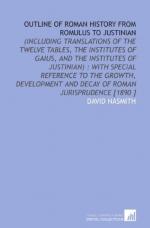2. Both conveyance (mancipatio) and surrender in court (in iure cessio) are confirmed.
3. Articles which have been sold and delivered are not acquired by the buyer otherwise than if he has paid the price to the seller or has satisfied him in some other way, that is, by providing a guarantor (expromissor) or a security (pignus).
4. It shall be sufficient to make good those [faults] which have been named by [one’s] tongue, [while] for those [flaws] which he (the vendor) has denied expressly [, when asked about these,] he (the vendor) shall undergo a penalty of double [damages].[24]
5. For a loyal person and for a person restored to allegiance there shall be the same right (ius) of bond (nexum) and of conveyance (mancipium) with the Roman people.[25]
6. Against an alien (hostis) title of ownership (auctoritas) shall be [valid] forever.[26]
7. A prescriptive title (usucapio) of movable things is completed by one year’s [possession], but [a prescriptive title] of an estate and of buildings [is completed] by two years’ [possession].
8. A person [who had been a slave and] who has been declared to be a free man [in a will on some condition], if he shall have given 10,000 [asses] to the heir, although he (the slave) has been alienated by the heir, by giving the money to the purchaser shall enter into his freedom.
9. If any woman [not married by confarreatio[27] or by co-emptio[28]] be unwilling to be subjected in this manner [by usus (possession)] to the hand of her husband (in manum mariti), she shall be absent [from his house] for three successive nights in every year and by this means shall interrupt the usus (possession) of each year.[29]
10. If the (the parties) join [their] hands [on the disputed property when pleading] in court (in iure), [the actual possessor shall retain provisional possession; but, when it is a case of personal freedom, the magistrate] shall grant the right of claim (vindicia) [provisionally to the party] asserting [the person’s] freedom.
11. [If he find that another has used his timber (tignum)[30] in building a house or in supporting vines,] a person shall not dislodge from the framework the timber fixed in buildings in vineyard; [but he shall have the right of action] for double [damages] against him who has been convicted of fixing [such timber].
12. Whenever [the vines] have been pruned, until fruit shall have been gathered [therefrom, the owner shall not recover the timber].
TABLE VII. REAL PROPERTY
1. [Ownership] within [a strip of] five feet [along a boundary] shall not be acquired by long usage (usucapio).[31]
2. The way round [each outer wall of a building] shall be two and one-half feet.




